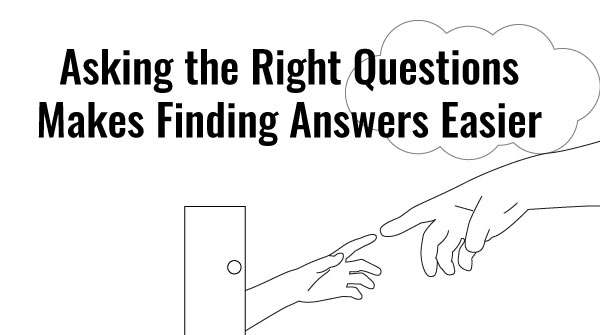 I heard this on a podcast the other day that I thought was a good, simple way to define answers and questions in relation to goal setting and pursuing meaningful work. The difference between answers and questions is ‘Answers are closed doors. Questions are invitations.’
I heard this on a podcast the other day that I thought was a good, simple way to define answers and questions in relation to goal setting and pursuing meaningful work. The difference between answers and questions is ‘Answers are closed doors. Questions are invitations.’
But then we must not just ask questions, we must ask increasingly better ones. Asking good questions is about perspective, our identity and discipleship, growing in the ways of our Creator, God. Don’t ask: “What should I be proficient in?” Instead, ask “What worldview am I operating from? And what type of person do I want to become?” These questions don’t eliminate the details of our lives or specific disciplines; they elevate them. We learn to read because God speaks. We learn to work hard and to love others not just because God has told us to do this in his commandments but because “The heavens declare the glory of God, and the sky above proclaims his handiwork. Day to day pours out speech and night to night reveals knowledge.” Ps 19:1-2. We work on our writing and communication in part because we have a mandate to “in your hears honor Christ the Lord as holy, always being prepared to make a defense to anyone who asks you for a reason for the hope that is in you; yet do it with gentleness and respect.” 1 Pet 3:15
You must continue to ask the question, what is the purpose of this? Why am I doing this? And seeking to know the answer, both from your own personal bent, i.e. your likes, dislikes, interests, and ideas but also from the perspective of who God is in you. Because in this life, we are simply a conduit of these things, we are not the originator of them. We simply choose what to do with them when we get them. Our ability to ask the right questions improves the quality of how we approach these details.
Asking good questions opens up not just an end goal or a focus on a specific end destination but the process of growth as we act on what we know, as we wait and as we struggle. Sometimes we find answers to questions and other times we don’t. But when we do find answers to our questions we reach a specific destination point and often a fork in the road. This answer could be either as we expect it or not as we expect it. In other words, some of the answers happen the way we want and other times they don’t.
Some questions could be external questions, ‘How do I engage with my neighbor? What do they think about me? How can I care more about them?’ or it could be internal desires like ‘Should I publish a book? What should I do with my time?’. There are lots of factors and details as to what we do and why we exist. Part of the growth process in life is acknowledging the journey where we can learn to objectively observe our own fears, shame, guilt, pride through first, acknowledging their existence. Over time we learn that some feelings will remain but we can change how they affect us through our response to them.
Some Answers are Better When They Don’t Go As Planned
Answers that shape us and grow us do not come as we expect them. These can be the best parts of life because life takes on meaning in ways that we cannot predict and this is what gives us a unique perspective. It is through my own experiences that I have learned the more I am ok with not having control and submitted to God the more I can be open-handed, less angry or jealous when things don’t go the way I had planned. This submission to God allows me to be more present in the moments I do have even when they are sometimes uncomfortable or unfamiliar. In this way, God shapes and molds us so we can bring value to the world in ways that might be different than what we expected.
Manipulative and Controlling or Open-Handed Questions
The difference between a good question and a bad question can define whether you are being manipulative and controlling or open-handed. For a basic example, I can ask my wife “would you please wash the dishes?” or I can ask “how can I serve you tonight?” or in this case I wouldn’t ask a question – I would just wash the dishes myself. How you frame a question matters.
Good Questions In Client Relationships Are the Ones that Are Being Asked
There are inevitably some things that are concrete answers, but most that have to do with our personal bent, our likes, our taste, and our talents and how we form them in our communication and our approach to answering questions is open. When finding clients, the best part is when they are asking their own questions. You can tell people the answers all you want, but if they aren’t searching for their own answers or if they are asking the wrong questions, you will have to help them make connections through giving them the answer or helping them ask better questions. When you give them the answer, you will be guessing to see if they were asking the right question in the first place. You’ll know by whether they hire you or not!
Pursue Good Questions for A Change of Heart and For the Benefit of Others
My hope for you is to encourage you in asking questions that are for your good. I have found in my own life, rather than ‘trying to fix’ things when my wife or someone shares their feelings or concerns I should simply be present and listen. My tendency is to suppress difficult emotions and “do work!” But, trying to fix things only makes things worse in the long run. Instead, press in and listen by asking questions and being fully present. Asking good questions is not just for your own personal gain, it is for your good and for others.For years, the main questions I asked were focused around “How can I make my way in this world?” With this question I viewed everything as a transaction, my relationship with God and with others and what I was learning was a condition on which I asked, how can I apply what I’m learning to my life? When I changed the question in my relationship with God to “Who are you God? And how can I know you deeply?” and stopped trying to make applications at all, over time, patience, peace, and joy began to appear. Personal applications began to sort of appear out of nowhere. It was not over night, but it was over time.
I started to picture my life in a different way and created my work life manifesto.

